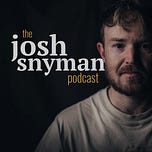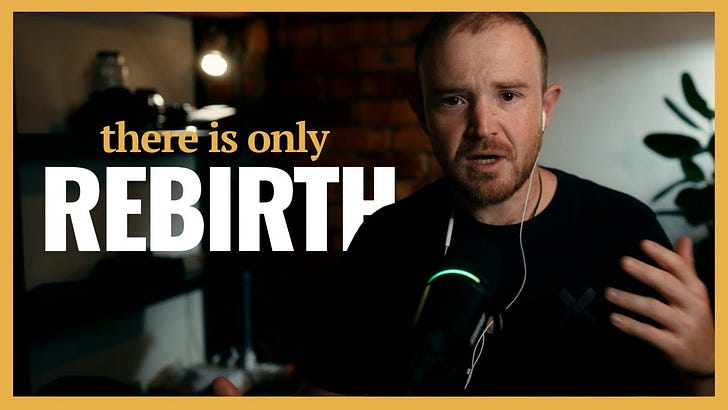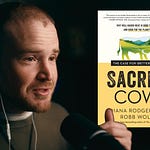It only takes one notification from a friend — “Hey, you won’t believe what happened…” — to completely derail a train of thought I was riding deep into something I was contemplating or writing.
The next few books helped me overcome this.
Kind of… I still stumble, a lot.
From teaching me how to live a more intentional, output-oriented life, to embracing productivity that’s actually sustainable (rather than the superficial fluff we call “productivity” but is really distraction), to learning how to use technology without letting it use me — these books have been pivotal in shaping my work-life balance as a self-employed creative.
The three books we’ll dive into in this episode are:
Deep Work
Slow Productivity
Digital Minimalism
All by Cal Newport.
What I love about Cal’s writing is its extreme practicality — modern tools for modern problems. It’s a nice counterbalance to my more spiritual, esoteric reads.
Hey, I’m Josh — a South African filmmaker and photographer. When I’m not out shooting around the world, I’m here in my Cape Town studio reviewing books & creating content.
I’ve grouped these three books together because they complement each other so well.
Book 1: Deep Work
One of the reasons I’m a filmmaker and love YouTube is because, ultimately, your work is what matters. Not your LinkedIn profile. Not your pseudo-CEO title in your Instagram bio. It’s whether you’re actually producing art that tells a coherent story. That’s it.
Cal wrote:
“If you don’t produce, you won’t thrive — no matter how skilled or talented you are.”
This reminded me of a friend from school. Incredibly talented. But he never produced. I don’t know if it was fear of rejection. I’d see flashes of brilliance and, honestly, feel jealous — but he never took it seriously enough to share his work.
Deep Work is about embracing the philosophy that anything worthwhile demands eliminating surface-level distractions — like the false sense of “progress” you get from posting on social media — and instead putting your phone on airplane mode for three hours to work uninterrupted.
This state is meditative. Even if you get distracted, the commitment to one task matters most. Over weeks, you build myelin in your brain and make more progress than you thought possible.
I see people split into two groups: creators and consumers.
Creators know how much effort it takes to bring something to life — even if you don’t resonate with their work, you can feel the hours of blood, sweat, and tears behind it. Consumers? Not so much.
And with AI now giving us instant answers, we risk losing the deep thinking required to wrestle with a problem until a breakthrough comes. Cal calls deep work the “superpower of the 21st century” — and I agree.
Here’s the kicker: deep work also gives deep joy. The satisfaction at the end of a focused day is built-in. Happiness isn’t the prerequisite for focus — focus creates happiness.
And rest? Rest is vital to working well. Don’t push late into the night to feel “busy.” Rest is medicine for the mind.
As Cal puts it:
“The deep life is not for everybody… there’s a comfort in the artificial busyness of rapid e-mail messaging and social media posturing. But the deep life demands you leave much of that behind.”
Book 2: Slow Productivity
The three principles of Slow Productivity are:
Do Fewer Things
Work at a Natural Pace
Obsess Over Quality
What I love is how this builds on Deep Work.
Cal writes about the madness of pandemic-era productivity:
“What was needed was time and space to adjust and grieve. What was provided instead were upgraded Zoom accounts and cheerful email exhortations to ‘stay productive.’ It was crazy-making.”
This resonates beyond work — social media has created the same pressure to be “visible” at all times. If you’re not constantly showing where you are, what you’re eating, or what you’re doing, you feel invisible.
I’ve put relentless pressure on myself based on false expectations, and Cal’s words helped me see that often my own anxieties are the toughest boss I’ll ever have.
The third principle — obsessing over quality — is a double-edged sword.
In today’s fast-fashion-style content economy, quality stands out like gold. You can feel when something’s been wrestled with for weeks or months. But… as a filmmaker and YouTuber, sometimes “done is better than perfect.”
Some projects — and people — are meant to be let go, so the lesson can be learned.
Book 3: Digital Minimalism
I found this one through a friend’s podcast recommendation. I’d read the other two books already, but Digital Minimalism was the missing piece. Sometimes, I think these little moments — a title mentioned in passing, a spark of curiosity — are God’s way of nudging us.
Like many of Cal’s books, it’s practical and full of stories on how to reduce digital noise and embrace a richer, more analog life. Ironically, becoming a digital minimalist has made my time online more psychedelic — a sacred, intentional space to learn, build, engage, and create.
Some of my digital minimalism habits:
Remarkable tablet for notes — no easy distractions. Same for my Kindle.
Turning off notifications and batching email/social media use (I call it Intermittent Social Media Fasting).
Focusing on two platforms: YouTube & Instagram, treated as extensions of my writing. Everything else? Deleted.
Without strong rules, you risk falling into the endless dopamine loop that social media engineers so well.
Summary
Jamie Wheal wrote:
“If we deny the sacred, the mundane will crush us. If we deny the mundane, the sacred will burn us.”
These books ground me — they get me off my spiritual high horse and into practical tools for navigating the modern world.
Believe it or not: if you leave your phone at home for a walk — or, God forbid, use your actual credit card instead of your phone at the coffee shop — you won’t die. You might even feel anxiety evaporate as you have a real conversation with a stranger.
This morning, I woke up at 5 a.m., made coffee, journaled, meditated, and wrote for hours — all because my phone was in another room on Do Not Disturb.
This isn’t bypassing reality. It’s mindfulness. It’s creating a sanctuary of focus before the inevitable chaos of the day. And when that chaos hits — it will — you’re ready. Because you’ve given your spirit what it craves: focus.










